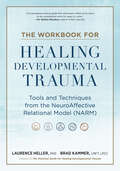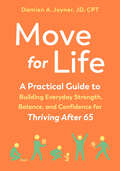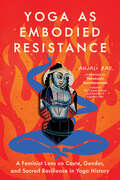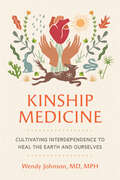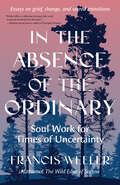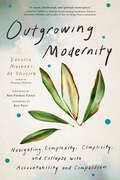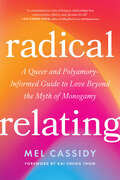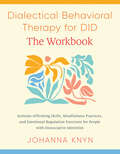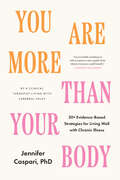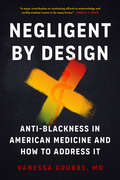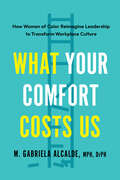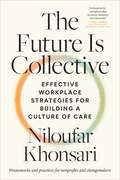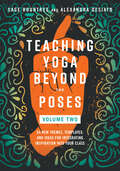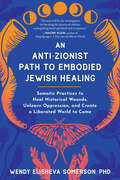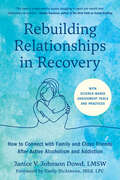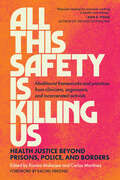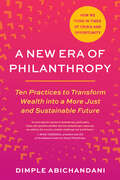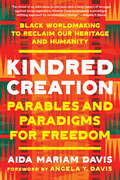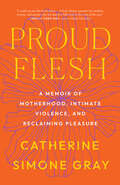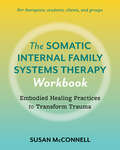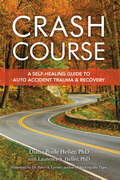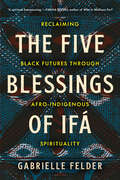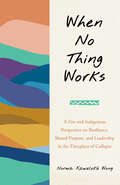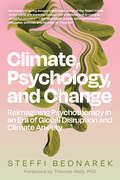- Table View
- List View
The Workbook for Healing Developmental Trauma: Tools and Techniques from the NeuroAffective Relational Model (NARM)
by Laurence Heller Ph.D. Brad J. Kammer LMFT, LPCCA comprehensive workbook for understanding and treating developmental trauma using the NeuroAffective Relational Model (NARM) Includes practical exercises for understanding ACEs, addressing C-PTSD, nurturing post-traumatic growth, identifying survival styles, and moreDesigned for clinicians, trauma therapists, and practitioners of the NeuroAffective Relational Model, this workbook offers a blueprint to NARM&’s transformative approach to healing developmental trauma. Authors Laurence Heller, PhD, and Brad Kammer share practical skill-building exercises that deepen your own relationship to the material as you learn new, evidence-based, and highly effective ways to work with clients&’ trauma. Complete with detailed charts, visually engaging graphics, and practitioner-focused questionnaires, this workbook provides tools for use in clinical sessions as well as personal professional growth. In an easy-to-apply format, the Workbook will explore:The 5 adaptive survival styles: Learn how developmental needs for connection, attunement, trust, autonomy, and love-sexuality are disrupted by trauma and map onto adaptive survival strategiesThe 4 pillars of NARM: Understand and apply key therapeutic skills that support healing and post-traumatic growthThe NARM Relational Model: Facilitate trauma resolution and real therapeutic growth via a dynamic, embodied processThe NARM Emotional Completion Model: Support clients in identifying their primary emotions, reflecting the emotion&’s intention, and building new relationships to unresolved emotional conflictsThe NARM Personality Spectrum: Use 10 psychobiological traits to understand and assess client self-organizationHeller and Kammer offer personal and therapist-oriented reflection questions to ground your work with NARM and assist you in integrating the model&’s nuances. Each section is designed to help practitioners translate NARM&’s advanced concepts into actionable strategies that deepen the therapeutic process—and whether you're new to NARM or seeking to refine your practice, the Workbook equips you with the resources to guide your clients toward profound healing and growth.
Move for Life: A Practical Guide to Building Everyday Strength, Balance, and Confidence for Thriving after 65
by Damien A. Joyner JD CPTCertified personal trainer Damien Joyner not only explodes the myth that growing older means growing weaker—he offers expert guidance and safe, simple, effective exercises to empower you to regain and maintain your strength and autonomy.I&’m often asked the following question: &“Do you train active agers any differently than their younger counterparts?&” In short—I don&’t. Their programming is based on their fitness level rather than their age, and just like their younger counterparts, they too possess the potential to move better or become stronger.Too often, society tells you: as you age, you'll become frail. You'll lose your mobility. It's time to slow down. But at a time when nearly 50 million Americans are aged 65+, these assumptions are more harmful than ever—especially because they're wrong.Joyner explains which exercises are the most important to prioritize for the movements you do every day—whether that&’s standing up from a chair or getting groceries from the car into the cabinet. His exercises are:Straightforward, safe, effective, and evidence-basedClearly illustrated via helpful how-to photo guidesTailored to meet the concerns of active agers, like improving bone densityAppropriate for beginner, intermediate, and advanced levels of fitnessFor keeping fit and doing real-world, everyday tasks that help you stay active and engagedAs a fitness professional who specializes in training people who are 50+, Damien Joyner's approach in Move for Life helps you build strength, increase flexibility, and work on your balance—all while dispelling any doubts you may have about your ability to stay active after midlife.
Yoga as Embodied Resistance: A Feminist Lens on Caste, Gender, and Sacred Resilience in Yoga History
by Anjali RaoWhat does yoga have to do with caste, gender, and power? This groundbreaking work explores how yoga can be a vital path to resistance, agency, and collective liberation.Yoga as Embodied Resistance illuminates the essential—but often unseen—relationships between caste and gender in yoga. Bridging scholarship, history, and cultural analysis, yoga educator and practitioner Anjali Rao exposes how caste oppression, patriarchy, and colonization impact contemporary practice, and offers readers radical ways to re-envision a yoga grounded in liberation, inquiry, discernment, and even dissent.Rao calls upon us to realize the work of co-creating a compassionate and courageous world, uplifting the stories of women and gender-expansive people who confront caste and gender dominance. The stories, or kathas, reflect different parts of yoga history from the Upanishads, the Puranas, and the Bhakti renaissance—and highlight the seismic shifts in consciousness about the potential of spiritual teachings for social change. She explores:Foundational histories of yoga, caste, and HinduismThe tensions among yoga, nationalism, anticolonialism, and IndigeneityThe impacts and intersections of yoga, gender, caste, and cultureBrahminical appropriation and its relationship to eros, spirituality, and loving devotionSanskritization, vernacularization, and the impact of patriarchy on bodily expressionBhakti as a subversive tool of personal agency and anticolonial resistanceWith provocative chapters like &“Is Yoga Hindu?&” and a foreword from Thenmozhi Soundararajan, Rao&’s work is both an invitation and a force of nature that lights up the path of yoga toward brighter, just, and more liberated futures.
Kinship Medicine: Cultivating Interdependence to Heal the Earth and Ourselves
by Wendy Johnson MD, MPHFor fans of Braiding Sweetgrass, The Future We Choose, and The Blue Zones, a book about the effect our relationship to nature has on our well-being and health.Our modern way of living is incompatible with our survival. Most of us intuitively know this truth, but almost everything in our society encourages us to ignore it. Dr. Wendy Johnson confronts this undeniable fact and breaks down how we think and act every day in ways that undermine our individual and collective well-being.The antidotes to many of the causal factors of poor health—loneliness, industrial diets, systemic inequality, fear of death, profit-based healthcare—are relational, with each other and with the living earth. Through evidence from public health, sociology, anthropology, human ecology, and her experience as a family physician, Dr. Wendy Johnson will show you how:We must incorporate an &“ecosystem&” perspective into modern medicineWhat you ingest and where you live can reinforce or upset your body&’s delicate balanceEliminating one organism in an ecosystem can affect all the othersHistories of trauma can be passed down for generationsRekindling our relationships to non-human life is essential to our well-beingBeing closer to death can release some of its power over usActions of communities will be stronger and more lasting than any individual effortsYou will leave with a clear vision of what a new society might look like, methods to accomplish this transformation, and concrete examples of where it is being done successfully.
In the Absence of the Ordinary: Soul Work for Times of Uncertainty--Essays on grief, change, and sacred transitions
by Francis WellerWe are at a threshold. As we face uncertain futures, the familiar is falling away. This book invites us to embody new ways of being and connecting so we can navigate troubled times togetherFrom the bestselling author of The Wild Edge of Sorrow, a beautifully packaged collection of 17 essays on meeting this moment with clarity, care, and skill Praise for The Wild Edge of Sorrow: "It blew me away. I underlined things on nearly every page." —Anderson CooperIn his singular and inimitable voice, psychotherapist and author of The Wild Edge of Sorrow Francis Weller offers 17 soulful essays to help us move together through the anxieties, difficulties, and sacred transitions of 21st-century life.In the Absence of the Ordinary frames our current era as a rough initiation—an upending experience of profound trauma and transformation that demands we reorient our ways of thinking, being, and relating. Through essays like &“Some People Wake Up…,&” &“The Gift of Restraint,&” and &“Gratitude for All That Is,&” Weller offers clarity and wisdom on how to face the sobering stakes of our time—while offering the nourishment and support we need to embody the new roles this initiation requires.Section 1, &“When the Bough Breaks,&” names our collective traumas and peels back the false armor of modernity. We&’re called to the depths, to understand the power of descent, and to cultivate the necessary skills of initiation.Section 2, &“Care of the Soul,&” differentiates between the connected soul and the individualistic self, inviting us back into alignment with the wider world of belonging. We learn to approach our experiences with reverence, work with our grief, and develop restraint, repetition, and self-compassion.Section 3, &“Meanwhile, the World Goes On,&” gives shape to the emptiness we carry and the ways modernity has severed us from our birthright of interconnectedness with the natural world. It offers rituals of gratitude and practices of kinship to restore our bond with the living Earth.In each essay, Weller fortifies us to become immense—to meet these unpredictable times with presence and faith, to restore our souls&’ place in the soul of the world, and to hold steady, amid and for it all.
Outgrowing Modernity: Navigating Complexity, Complicity, and Collapse with Accountability and Compassion
by Vanessa Machado de OliveiraThe inevitable is coming fast. We know it in our bones—and it&’s past time to face it. The highly anticipated follow-up to Hospicing Modernity: how we activate responsibility, nurture care, and grow up in the face of collapse—includes reflections, exercises, and promptsClimate collapse, social crisis, the decline of modernity: colonialism, capitalism, and our full-faced denial have ushered in an urgent new era. Hospicing Modernity asked us to grow up, step up, and show up for our communities and the living Earth. Outgrowing Modernity helps us make sense of where we&’re going—and deepen what&’s possible—in a time of endings.Vanessa Machado De Oliveira helps us face the logics and workings of modernity, bringing us to clear-eyed terms with its expiration. She explores the impacts of colonialism as neurocolonization: an oppressive function of modernity that rewires how we think, act, imagine, and adapt. These impacts are wide-ranging and run deep: they cut us off from our natural ways of building community and seeking pleasure. They choke our ability to cope with trauma and embrace complexity. And they trap us in a state of artificial comfort and denial that keeps us from collectively growing up—even when our existence demands it.This book invites you to interrupt 5 lies that neurocolonization instills in us—beliefs (and behaviors) that have condition us to think we&’re owed the following, regardless of others or the planet:Moral and epistemic self-righteous authorityUnrestricted, unaccountable autonomyArbitrating truth, law, and common senseAffirming one's virtues, innocence, and purityExploitative appropriation and accumulation of various forms of capitalIn moving away from these ingrained worldviews, we can choose instead to develop 4 capacities necessary to our—and Earth&’s—survival: sobriety, maturity, discernment, and responsibility.Machado De Oliveira moves beyond critique into a praxis of strategic disinvestment: one that invites us to recognize what no longer serves us and reinvest in nurturing structures and lifeways that restore our knowledge in the value of life for life&’s sake.
Radical Relating: A Queer and Polyamory-Informed Guide to Love Beyond the Myth of Monogamy
by Mel CassidyA provocative, trauma-informed guide to post-monogamy—how to build liberated relationships rooted in empowerment, equity, and authenticity With practical somatic exercises, reflection prompts and a relational toolkit—also includes a glossary of polyamory, non-monogamy, and alternative relationship termsThis book is for polyamorists who want to practice their non-monogamy with more feminism, more queerness, and more community building. It&’s for monogamists who don&’t want to do relationships on autopilot. It&’s for everyone who dearly believes a better way to love and live exists. It&’s for change makers who aspire to re-wild the ways we love.An empowering guide to imagining (and living) better relationships, Radical Relating pushes back on the monogamy mandate. Author, somatic educator, and relationship coach Mel Cassidy explodes the often-unquestioned mainstream myths about the nuclear family structure: those that tell us your soulmate must be your sole mate. That sex is the only yardstick of relational success. That self-sacrifice and self-denial are necessary trade-offs for security and partnership. That we need to ride the relationship escalator all the way up, or we&’ll die alone.In four sections, Cassidy explains the why, what, how, and where of the Radical Relating model. They:Lay out clear-eyed analysis about why monogamy isn&’t working and explain the harms of unquestioned internalized mono-normativityOffer Reflective Journaling prompts, Somatic Pauses, and practical wisdom for assembling your Relational ToolkitExplain the trauma-informed pillars of Radical Relating: Orientation, Resilience, Resolution, and EngagementHelp you reorient to a new map for relating that&’s queer, anarchist, and somatically integratedHelp you build skills to understand and navigate your relationship landscapeExplore the intersections of monogamy, colonialism, patriarchy, and capitalism and illuminate how monogamous relationship structures emerged with one goal in mind: to consolidate capitalMost books on non-monogamy focus on top-level logistics and play into beliefs that can inadvertently replicate oppressive structures. Radical Relating is different: it speaks to readers who want not only to open up their relationships or expand their sexual experiences, but claim a new and liberating ways to relate to each other, fulfill our authentic needs, and build true communities of care beyond monogamy.
Dialectical Behavioral Therapy for DID--The Workbook: System-Affirming Skills, Mindfulness Practices, and Emotional Regulation Exercises for People with Dissociative Identities
by Johanna KnynEmpowering DBT skills for grounding, emotional regulation, values-guided action, and interpersonal effectivenessDialectical Behavioral Therapy for DID—The Workbook is an empowering guide and an invitation to explore what living well with dissociative identities means to you—at your own pace, and on your own terms.This workbook has been intentionally created to honor all your parts—and embrace your multiplicity. Its goal isn&’t to deny or stifle your identities: It welcomes you as you are, teaching you to trust your internal community and build radical acceptance. This workbook is designed to support your journey toward wellness, however you define that for yourselves.The workbook includes 4 modules:• Grounding Skills offers foundational tools to help you connect with the present moment, mindfully relate to body-based experiences like pain andillness, and honor your internal experience with radical acceptance.• Emotional Regulation Skills includes exercises to help you understand your emotions and make sense of your feelings.• Values-Guided Action Skills helps you identify your values and take committed action in alignment with those values.• Interpersonal Effectiveness Skills gives you tools for communicating with others, setting boundaries, and developing your internal relationships.With gentle check-ins, mindful activity breaks, and bonus exercises like &“Difficult Emotions Decisions Tree&” and &“Pain, Damage, Illness&” mapping, this workbook is grounded in care, compassion, and consent. It offers overviews of key concepts like the &“Window of Tolerance&” and &“Safe-Enough versus Safe,&” inviting you to build supportive containers for your DBT skills. It also provides guidance and checklists to help you create a comfortable environment that accommodates different sensory needs as you embark on your journey through the book.
You Are More Than Your Body: 30+ Evidence-Based Strategies for Living Well with Chronic Illness--By a clinical therapist living with cerebral palsy
by Jennifer Caspari PhdA gentle, supportive guide to developing coping skills and improving quality of life for disabled and chronically ill peopleManaging the stresses of everyday life can be exhausting and overwhelming. Dr. Jennifer Caspari knows this struggle well—both through her work as a clinical psychologist and her lived experience as a disabled woman with cerebral palsy. You Are More Than Your Body weaves together clinical expertise, personal stories, and practical, evidence-based tools to help readers with chronic health conditions better cope with pain, fatigue, depression, and the emotional vulnerability that comes with living in a world not designed for our bodies. The methods in this book synthesize a wide range of emotional regulation skills and coping techniques drawn from cognitive behavioral therapy (CBT), acceptance and commitment therapy (ACT), and mindfulness practices, all of which Dr. Caspari has successfully used with her own clients. In this book, you&’ll learn over thirty practical coping skills to help you:tune into internal experience and connect with your body; shift mental focus;cultivate self-compassion and radical acceptance; change your relationship with your thoughts; engage the power of the present to get unstuck; practice realistic goal-setting;tap into your deepest values as a resource;tolerate discomfort; andgive yourselves permission to do things differently.Each chapter includes a personal story or experience; a self-reflection exercise; associated coping skills; and practical guidance on how you can start using these tools in your own life. Having a disability or chronic illness does not have to mean accepting a lower quality of life. While we can&’t make our issues and challenges disappear, by practicing the exercises in this book, we can learn to better manage challenges that arise and learn how we can live a meaningful life now—whatever our bodies and abilities might be.
Negligent by Design: Anti-Blackness in American Medicine and How to Address It
by Vanessa Grubbs MDA searing critique of medical racism and a powerful call for health-care professionals to make real change in their field, written by a leading activist and doctorUnequal access to care. Misdiagnosis. Mistreatment. Medical gaslighting. An increasing number of studies show the profound impacts racism has on communities of color—particularly Black Americans. But these disparities in health care and wellbeing are not the result of a handful of uninformed or malicious doctors: racism in the medical system is institutional, woven into the very fabric of diagnostic criteria and even hospital infrastructure. Medicine denies fair treatment to Black patients not in error…but by design. Drawing from extensive research, in-depth interviews with medical students and resident physicians, and over twenty-five years of experience as a medical doctor, Dr. Vanessa Grubbs argues that the reason racism in medicine continues to go unchecked is because it is in fact the standard of care. Any attempts to dismantle medical racism through &“placebo&” efforts such as forming diversity committees or releasing statements condemning racism will fail, she says, because they don&’t address the reality of how the institution of Medicine has been, and continues to be, negligent when it comes to the treatment of Black people. Dr. Grubbs skillfully unpacks the three core problems of how our health-care system currently considers the race of patients, which she identifies as being &“race based,&” &“race disregarded,&” and &“race denied.&”When medical diagnoses and trainings are race based, they lead doctors to make different treatment decisions for Black patients, and create a dangerous disadvantage.At the same time, medical textbooks and trainings may inappropriately disregard race in cases when it does matter, like failing to include pictures of how rashes may appear differently on light and dark skin—leading to misdiagnosis and death.And finally, many medical institutions still deny the extent to which racism is an issue at all, resulting in fewer Black physicians and disastrous outcomes for Black patients. Calling on her medical colleagues to join her in working against the negligence of American medicine, Dr. Grubbs lays out a pathway to true equity and inclusion in health care: getting to the root of the underlying fears and insecurities that have led to racist medical negligence; recruiting and retaining a diverse physician workforce; and forcing Medicine to commit to the cultural humility necessary to rebuild, not just replaster, a broken institution.
What Your Comfort Costs Us: How Women of Color Reimagine Leadership to Transform Workplace Culture
by M. Gabriela Alcalde MPH DrPHLeading for survival, leading for liberation—how to uplift women of color, transform cultures of complicity, and upend white supremacy culture at workWorkplace leaders: white comfort comes at the safety of women of color—and it costs lives and livelihoods. Microaggressions, structural barriers, unpaid emotional labor: WOC in leadership disproportionately bear the burdens of white supremacist work cultures, even as they&’re expected to take charge of reforms. But building better workplaces—less toxic, racist, and misogynistic workplaces—is everyone&’s responsibility and for everyone&’s benefit. And letting it fall solely to women of color is causing real harm. The stakes are high, and it&’s past time for change.What Your Comfort Costs Us offers essential reading and transparent advice for leaders who are ready to address structural inequity at work. With chapters like &“Talking About Racism is Hard,&” &“Checking the Boxes,&” and &“Uncovering the Added Burden and Toll of Unpaid and Unseen Emotional Labor,&” anti-supremacist philanthropic and nonprofit leader and author M. Gabriela Alcalde challenges us to rethink how we engage power—and take radical action toward reorienting it toward collective liberation. You&’ll learn:Research-backed analysis and practical solutions to transform workplace cultureHow systemic racism and structural violence shows up at work (in ways you may not expect)What happens when workplaces shift to prioritizing WOC&’s material safety over white comfortReal stories and insights from 10 women of color in leadershipHow white allies and accomplices can show up and step up authenticallyInterwoven with Alcalde&’s own experiences, professional expertise, and proven recommendations on how to do better, this book is a necessary guide to nurturing empathy, challenging complacency, and activating meaningful allyship. Alcalde awakens your potential to transform workplace cultures beyond business-as-usual bandaids, offering critical wisdom for systemic change and authentic collective empowerment at work.
Choosing to Lead Against the Current: The Courageous Operating System for Changemakers--Empowering leaders to transform the world with integrity, impact, and purpose
by Eveline ShenThis is the blueprint we need to lead with audacity, transform oppression into power, and ignite a future rooted in collective liberation. —Lateefah Simon, US Congress member and MacArthur &“Genius&” Fellow Heart-centered tools for social change leaders to foster courage, keep momentum, and manage burnoutIn the face of complex challenges, capable leaders need more than a simple box of leadership tools. They need an internal system of leadership, a tested operating system to help them navigate successfully through forces of oppression, while staying connected to their purpose, values, and vision.In Choosing to Lead Against the Current, award-winning movement leader, social change strategist, and executive director Eveline Shen shares her Courageous Operating System, a revolutionary system designed to help positive transformation leaders cultivate their power, sustain themselves both mentally and physically, and create lasting conditions for success.With inspiring stories and case-studies drawn from her own experiences, as well as, from her work with other change leaders, topics include how to:Turn encounters with adversity into sources of strengthRedefine success on one&’s own termsBuild creative momentum against forces of oppressionTransform failures into progressPrioritize short and long-term self-careShen&’s system has been taught to leaders in over 200 organizations across the U.S. and global South. It&’s holistic in nature, with different elements designed to work as one. Choosing to Lead Against the Current takes readers through the system's components, with exercises at the end of each chapter to help integrate them into any leadership style.Shen&’s offering teaches anyone leading against the current how to harness their full leadership power to build a future that values the liberation of all people and life on this planet.
The Future Is Collective: Effective Workplace Strategies for Building a Culture of Care--Frameworks and practices for nonprofits and changemakers
by Niloufar KhonsariTransform workplace structures and empower cultures of care—a practical guide for nonprofit leaders and social justice organizationsThis book is a powerful call for nonprofits and movement organizations to rethink their internal systems and processes—and to bring workplace culture and management into alignment with their political values and liberatory missions.Drawing on two decades of experience in community organizing and nonprofit leadership, Niloufar Khonsari guides us in transforming our workplaces by decentralizing power; implementing collective governance structures; and centering principles of transparency, equity, and mutual care.Khonsari demystifies collective management for fellow activists, nonprofit workers, and community leaders. This book is not a one-size-fits-all plan; instead, readers are encouraged to draw from its rich collection of real-world examples, case studies, sample workplace policies, tools developed by activist collectives, and personal reflections of movement leaders to explore what works best for their organization at its current stage of growth and evolution.Khonsari also address how to communicate workplace changes to funding bodies—and why this is an essential part of your movement work. Crucially, this book looks at how to handle challenging workplace dynamics, everyday conflicts, and job terminations using a compassionate justice-centered approach. Khonsari calls for nonprofit and movement leaders to embrace conflict resolution as a generative practice—one that builds and strengthens us, nurturing both individual autonomy and collective responsibility.Inspiring and hopeful, The Future is Collective guides nonprofit workers, activists, and community leaders toward a workplace culture of care that truly models the relational systems we want to see in the world.
Teaching Yoga Beyond the Poses, Volume 2: 54 New Themes, Templates, and Ideas for Integrating Inspiration into Your Class
by Sage Rountree Alexandra DeSiatoVolume 2 of the bestselling guide for yoga teachers—design fresh, confident, and dynamic classes your students will love 54 inspired new themes: a full year of templates to engage, retain, and connect with your studentsThis companion volume—with all-new material—offers 54 ready-made ideas and templates to elevate your classes, refine your voice, and teach inspired themes with joy and confidence.Each chapter—like Rise to Joy, Less is More, and Rebel, Yogi!—introduces a series of updated themes. Authors Sage Rountree and Alexandra DeSiato offer practical upgrades to the bestselling first volume of Teaching Yoga Beyond the Poses, with new prompts, expanded notes, and thoughtful cues to help you connect with students and center their experiences in class. Each template offers useful guidance on:Expounding on your theme and connecting it to both personal and universal experiencesChants, quotes, mantras, poems, or songsSpecific practices that work with your themeDistilling your theme to a short sentence or intention for your classTakeaway ideas and helpful notesAny of the 54 class themes can be used as-is or molded to embody your own personal teaching style and authentic voice. Each includes insightful options for opening your class, suggestions for what to say during movements and pauses, and helpful ideas for closing out strong. Grounded in the knowledge that yoga philosophy is applicable to our daily lives—and its wisdom is for all of us—this book offers adaptable and easy-to-use ways to transform your classes, empower your students, and build richer, more meaningful connections by teaching beyond the poses and into the world.
An Anti-Zionist Path to Embodied Jewish Healing: Somatic Practices to Heal Historical Wounds, Unlearn Oppression, and Create a Liberated World to Come
by Wendy Elisheva Somerson PhDUnapologetically anti-Zionist and firmly rooted in Jewish spiritual values—a liberatory model for Jewish healing Body-based tools and faith-based practices for processing trauma, reclaiming our agency, and building a world where "never again" means "never again for anyone""...an accessible pathway for healing from historical trauma, releasing it from our bodies, and preventing it from being passed on to future generations. This may well be the missing piece for breaking the pattern of violence undergirding Israeli apartheid and occupation.&”—Naomi Klein, author of Doppelganger: A Trip Into the Mirror World Dr. Wendy Elisheva Somerson, PhD, shows how Jewish history lives in Jewish bodies—and how antisemitism and oppression disrupt our access to safety, dignity, and belonging. This unmetabolized trauma can lock us into a survival state that brings historical grief into the present moment…and keep us from exploring critical questions that help us tend our legacies and live into a better world.How does ancestral grief live on in our bodies and keep us from feeling safe—and how is that fear enacted on other peoples? How do we reconcile a history of persecution with the state power of Israel today?Each chapter invites us back into the body, exploring healing as a spiritual and political reclamation. With skills-based wisdom for trauma, safety, spiritually grounded intentions, and resourcing ourselves for difficult conversations, this book also helps readers understand: Trauma and healing through our bodiesJewish longing, belonging, legacies of assimilationHealing shame—of not being Jewish enough, of being too much, and of being complicitEmbodied experiences of Jewish resilience, ritual, and griefRooted in justice, care, and spiritual depth, this book asks us to live into a Judaism beyond Zionism. It invites us to heal toward liberation—to reclaim Jewish faith and release Jewish identity from the colonial project of Israel in power, skill, and community.
Rebuilding Relationships in Recovery: How to Connect with Family and Close Friends After Active Alcoholism and Addiction--With science-based assessment tools and practices
by Janice V. Johnson Dowd LMSWHow to heal relationships, mend rifts with loved ones, and balance the demands of sobriety with the need for family connectionAn empowering guide for recovering addicts and alcoholics from an author with lived experience and professional expertiseIn Rebuilding Relationships in Recovery, Janice V. Johnson Dowd shows readers how to repair and enhance their relationships after active addiction. With personal insights and professional wisdom, Dowd—a licensed social worker in recovery—explores her own personal journey through alcoholism, offering a realistic and transformative guide.Centered on nurturing the critical balance between the self-healing of your own sobriety journey and building bridges and connections with loved ones, Dowd&’s narrative combines empathetic insights with practical tools. The book covers:Understanding Addiction's Impact: Exploring how addiction affects family dynamics and the individual&’s role within them.Effective Communication: Strategies for opening dialogue and maintaining honest, supportive conversations.Setting Realistic Expectations: Dispelling common misconceptions and establishing attainable goals in recovery and relationship rebuilding.Making Amends: A step-by-step guide to acknowledging past harms and initiating the healing process.Support Networks: Developing and maintaining a support system that encourages sobriety and personal growth.Rebuilding Relationships in Recovery is a roadmap to healing and thriving in sobriety, offering hope and actionable strategies for those seeking to rebuild trust and deepen their family bonds.
All This Safety Is Killing Us: Health Justice Beyond Prisons, Police, and Borders--Abolitionist frameworks and practices from clinicians, organizers, and incarcerated activists
by Ronica Mukerjee Carlos MartinezA multi-discipline, multimedia guide to abolition through the lens of healthcare and medicine – featuring writings and artwork from 10+ incarcerated and post-detention activistsExposing how marginalized communities are vilified by &“carceral safety&” systems, educators and health justice advocates Carlos Martinez and Ronica Mukerjee call for a radical break with reformist strategies in favor of ones grounded in grassroots organizing and abolitionPrisons, border security, and police forces are meant to protect. Yet for the most vulnerable, they more often cause harm. Funded in response to a never ending &“crime wave,&” people with disabilities, Black and brown people, trans and queer people, people with mental health diagnoses, and survivors of trauma and abuse are targeted by punitive carceral policies. These policies perpetuate physical, psychological, and intergenerational harm. And they don&’t keep anyone safe.All This Safety is Killing Us reflects this view, combining political strategy with evidence-based medical and social science research to envision a post-carceral society.With contributions from scholars, activists and artists, All This Safety is Killing Us marks a radical break from punitive frameworks. Special features include: Contributions from nurses, doctors, doulas, public health workers, physical therapists, acupuncturists, and disability justice workers.Woodcuts, comics, mini-zines, infographics, and drawings by community activists, queer and trans/gender expansive-focused writers, current prisoners, deportees, and survivors of state-sanctioned violence.Interviews with leading abolition and health justice scholars.Bringing scholarly research into public conversation, this book shows that those working within public health and medical fields have a critical role to play in creating a truly safe and flourishing society.
A New Era of Philanthropy: Ten Practices to Transform Wealth into a More Just and Sustainable Future-- How we fund in times of crisis and opportunity
by Dimple Abichandani&“A must-read for anyone in philanthropy, particularly those who question whether and how philanthropic resources can address the current, complex challenges our world faces.&” —Nick Tedesco, president and chief executive officer of the National Center for Family Philanthropy A blueprint for how wealth can be transformed into a more just and sustainable future in times of rapid change and crisis.On the cusp of the greatest wealth transfer in history—with $84 trillion dollars moving between generations in the next 20 years—this book explores how philanthropy can be transformative, and transformed.Can philanthropy be an anti-racist, feminist, relational, and joyful expression of solidarity?This book argues that it not only can be—for the future we seek, and for philanthropy to achieve its greatest impact, it must be.Nationally recognized philanthropic leader Dimple Abichandani revolutionizes the precepts of modern philanthropy. Offering 10 provocative practice shifts, A New Era of Philanthropy engages readers with fresh answers to the question of how philanthropy can meet this high-stakes moment—from reimagining governance to aligning investments to crisis funding and beyond.Abichandani highlights paradigm shifts that model the way forward, moving beyond critique into real transformation, with relatable stories about funders who are forging a new era of philanthropy.A New Era of Philanthropy picks up where key books like Decolonizing Wealth and Winners Take All leave off, offering a guide for donors, foundations, and non-profit leaders navigating philanthropy in urgent times. Clear-eyed, hopeful, and responsive to the moment, this book helps us reimagine the purpose and norms of modern philanthropy. It is an invitation to all of us who believe these resources can contribute to a more just future: start here.
Kindred Creation: Parables and Paradigms for Freedom--Black worldmaking to reclaim our heritage and humanity
by Aida Mariam DavisA vital path home. Employing African epistemologies and an embodied African beingness, this book embraces the revelation and miracle of Blackness.Creating a world worthy of our children requires recalling the dignity and distinction of the African way of life.This book is not written for settler consumption. Kindred Creation is a call and response to dream and design better worlds rooted in African lifeways: a path to Black freedom, a love letter to Black futures, and a blueprint to intergenerational Black joy and dignity—all (and always) on Black terms.Author, organizer, and designer Aida Mariam Davis explores the historical and ongoing impacts of settler colonialism, making explicit the ways that extraction, oppression, and enslavement serve the goals of empire—not least by severing ancestral connections and disrupting profound and ancient relationships to self, nature, and community.Structured in three parts—Remember, Refuse, and Reclaim—Kindred Creation is a philosophical guidebook and a vital invitation to power and reconnection. Davis employs parable, poetry, theory, memory, narrative, and prophecy to help readers:Remember: By unforgetting the unending and cascading violence of settler colonialism and other forms of domination and exploring the ways that African land, language, lifestyle, and labor are stolen, distorted, and repackaged for colonial consumption to extract capital and sever ties to ancestral knowledge, lifeways, and dignityRefuse: By rejecting and interrupting death-making institutions and relationships and choosing kinship and self-determination in the face of settler colonial violenceReclaim: By revealing that freedom is within us—and within reach. Davis shares how the reader can birth new worlds and relationships and offers strategies for reclaiming land, language, lifestyle, and labor.The colonial violence and dispossession of African land, language, and labor is inflicted intentionally—and by design. Reclaiming African lifeways and remembering what was forcibly forgotten must be by creation: a re-membering of our interconnectedness and kinship.
Proud Flesh: A Memoir of Motherhood, Intimate Violence, and Reclaiming Pleasure
by Catherine Simone GrayA searing portrait of a mother&’s body—a resurrection and reclamation of pleasure after abuse, a study of intergenerational trauma, and a love letter to the bodies of women: as alive and unbound as the teeming Mississippi wilds that bear witnessFour months postpartum with her second child, Catherine Simone Gray is back at her doctor&’s office, surveying a childbirth wound that refuses to mend. Proud flesh: tissue that overheals to become its own wound. Pregnancy and motherhood had been physically vulnerable for Gray, but this renders her most intimate parts unrecognizable—like her body is no longer her own. Has it ever been her own?As she gets to know her body in its new form, she encounters, too, the girl she&’d been at seventeen. It was summertime in Mississippi—wild, pulsing with life—when a man coerced her into an abusive relationship that would dominate her life for four years.Told in parallel timelines, Proud Flesh grapples with the legacy of intimate partner violence in motherhood. With luminous prose and breathtaking viscerality, Gray makes legible the ways that abuse can imprint on our body and seethe undetected for years. She lays bare unspoken truths: that violence remaps how we connect with and care for our children. That the pains of our mothers—and our mothers&’ mothers—endure, and can prowl the edges of our stories too. That even amid pain, our bodies can teach us new truths about our capacity to heal and experience pleasure.Proud Flesh rewrites the body of the mother beyond the borders—bold, defiant, and heart-stoppingly true, it&’s an unputdownable memoir and a force of nature.
The Somatic Internal Family Systems Therapy Workbook: Embodied Healing Practices to Transform Trauma--For therapists, students, clients, and groups
by Susan McConnellThe companion workbook to Somatic Internal Family Systems Therapy—a practical guide to the 5 pillars of embodied IFS for trauma therapists, Somatic Experiencing™ practitioners, and mental health healersWith embodied exercises, foundational knowledge, and practical guidance, The Somatic Internal Family Systems Therapy Workbook shows therapists and clinicians how to embody the five practices of Somatic IFS: somatic awareness, conscious breathing, radical resonance, mindful movement and attuned touch.Each works together to facilitate trauma healing with clients and build embodied safety, integrate unresolved harm, and develop the ability to name, process, and understand emotional and somatic sensations. The workbook opens by inviting the therapist to explore their own Internal System, offering an embodied approach to experiencing the model. Chapter 1 explores and explains foundational concepts like somatics; embodiment; Parts; Self; and the cultural influences that shape and shift our embodied experiences. Chapters 2 - 6 move into theoretical grounding, clinical applications, and practical exercises for each of the five principles. They offer tools to:Develop clients' ability to name, describe, and convey sensationsRecognize and track for signs of client overwhelmWork with Parts that fear body awarenessUnderstand the purpose and clinical benefits of conscious breathingRestore the Embodied Self Explore therapeutic shifts from doing to to being with clientsHeal attachment woundsIntegrate mindful movement into healing developmental traumaUnderstand and practice attuned touchEach practice is designed to be used whenever it will be of benefit: the tools and exercises are non-linear and adaptable, and aren&’t limited by a prescriptive sequence. The workbook also explores links between current psychotherapeutic practice and ancient healing modalities, grounding SIFS in a larger web of effective somatic trauma healing and embodiment approaches.
Crash Course: A Self-Healing Guide to Auto Accident Trauma and Recovery
by Diane Poole Heller Laurence S. HellerTrauma following automobile accidents can persist for weeks, months, or longer. Symptoms include nervousness, sleep disorders, loss of appetite, and sexual dysfunction. In Crash Course, Diane Poole Heller and Laurence Heller take readers through a series of case histories and exercises to explain and treat the health problems and trauma brought on by car accidents.
The Five Blessings of Ifá: Reclaiming Black Futures Through Afro-Indigenous Spirituality
by Gabrielle FelderA fierce and inspirational guide to Black resistance, resilience, and healing, using the principles of Afro-Indigenous spiritual practicesUnderstanding where you came from is crucial to understand where you are going.The Five Blessings of Ifá explores how Black communities across the diaspora draw strength from ancestral wisdom, family, community care, and mutual aid, using the principles of Ifá—a West African spiritual tradition—as a guiding framework. Gabrielle Felder provides a blueprint for living a more fulfilled and abundant life through the blessings of Aiku (longevity), Aje (wealth), Aya and Oko (relationships), Omo (children), and Isegun (victory over negative forces), providing practical examples of how Black folks have built resilience and learned to thrive in the face of oppression. Longevity exists in ancestral traditions that we cultivate over generations, which Felder explores through practices of traditional herbalism as well as contemporary sustainability and food sovereignty movements.Wealth, in Felder&’s interpretation, has to do with the richness created by community, including cultural traditions of food, dance, and music that connect seemingly disparate African diasporic cultures.Partnership, traditionally understood in Ifá as husband and wife, is reconsidered by Felder to include a wide variety of relationship structures, including familial bonds and queer families.To explore the blessing of children, Felder dives into the important history of doulas and midwives in Black communities, and their crucial role in combatting the high maternal mortality rate among Black women in the US.Finally, Felder draws out the meanings of the blessing of victory through a wide range of examples of Black autonomy: slave rebellions; the rejection of Euro-centric beauty standards; mutual aid practices among Black revolutionary groups; and the contemporary Black witch movement.As a collective, Black folks have managed to usher in the five blessings of Ifá into our lives despite all odds. This book is a love letter to those who have come before us, and a guide to the possibilities that lie in our collective future.
When No Thing Works: A Zen and Indigenous Perspective on Resilience, Shared Purpose, and Leadership in the Timeplace of Collapse
by Norma WongSpiritual and community lessons for embracing collective care, co-creating sustainable worlds, and responsibly meeting uncertain futures—a Zen and Indigenous take on building better, more balanced ways of being For readers of Hospicing Modernity, When Things Fall Apart, and Zen and the Art of Saving the PlanetTalking story, weaving poetry, and offering wisdom at the intersections of strategy, politics, and spiritual activism, When No Thing Works is a visionary guide to co-creating new worlds from one in crisis. It asks into the ways we can live well and maintain our wholeness in an era of collective acceleration: the swiftly moving current, fed and shaped by human actions, that sweeps us toward ever uncertain futures. Grounded in Zen Buddhism, interconnection, and decades of community activism, When No Thing Works explores questions like:As we stand at a threshold of collective change, what leaps must we make?How can we push through discord and polarization and meet these critical changepoints collectively?What practices, strategies, and spiritualities can align to vision a sustainable future for our communities and descendents?How can we step out of urgency to tend to our crises with wisdom, intention, and care? With wise and witty prose that wanders and turns, guides and reveals, Zen master and Indigenous Hawaiian leader Rōshi Norma Wong&’s meditation holds our collective moment with gravity and tender care. She asks us to not only imagine but to live into a story beyond crisis and collapse—one that expands to meet our dreams of what (we hope) comes next, while facing with clarity and grace our here and now in the world we share today.
Climate, Psychology, and Change: Reimagining Psychotherapy in an Era of Global Disruption and Climate Anxiety
by Steffi BednarekWith so many immediate and intensifying crises unfolding around us, how can therapists adapt to promote healing and growth?&“As these intriguing essays make clear, some of the finest minds in the world are thinking through the problems and arriving at powerful answers."—Bill McKibben, author, environmentalist, educator, activist, and founder of Third ActWith essays from Francis Weller, Bayo Akomolafe, Hāweatea Holly Bryson, and moreWestern psychotherapy views our practice as a way to bring clients back to baseline &“normal.&” But our society&’s &“normal&” is profoundly unwell: our ways of being reflect the same unsustainable systems that erode our ecosystems, accelerate global destruction, and ultimately extract our humanity. Moving toward healing and purpose in uncertain times means evolving the way we do therapy and the way we think about mental health.Editor and climate psychologist Steffi Bednarek invites us to co-create a field that navigates unknown futures with skill and grace—one that helps clients build resilience and holds space for the uncertainties unfolding before us. She and 32 contributors explore ideas like:Decolonizing therapyUsing therapeutic tools to respond to traumaWhat psychologists can offer movements for social change and climate justiceHelping clients recognize and move past unhelpful responses to climate emergencyNurturing creativity in the face of crisisHolistic and intersectional, this collection reckons with the ways power, colonialism, and capitalism impact our myriad crises—while shaping Western psychology as we know it.With essays by clinicians from both the Global South and Global North, Climate, Psychology, and Change is an anthology unlike anything you&’ve read before: a necessary response, an urgent appeal, and a fearless look forward at how we care for our clients, eyes wide open, with compassion and skill in an uncertain world.
